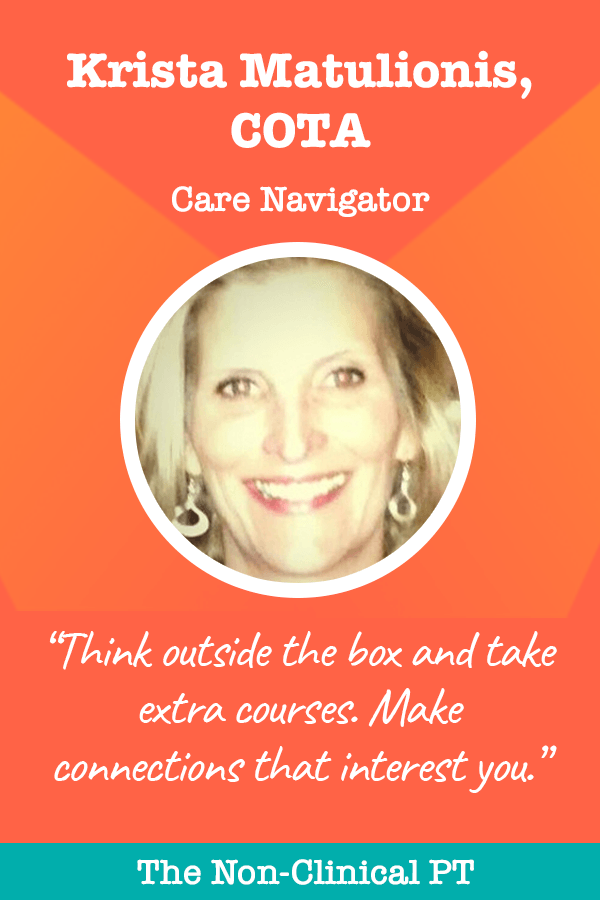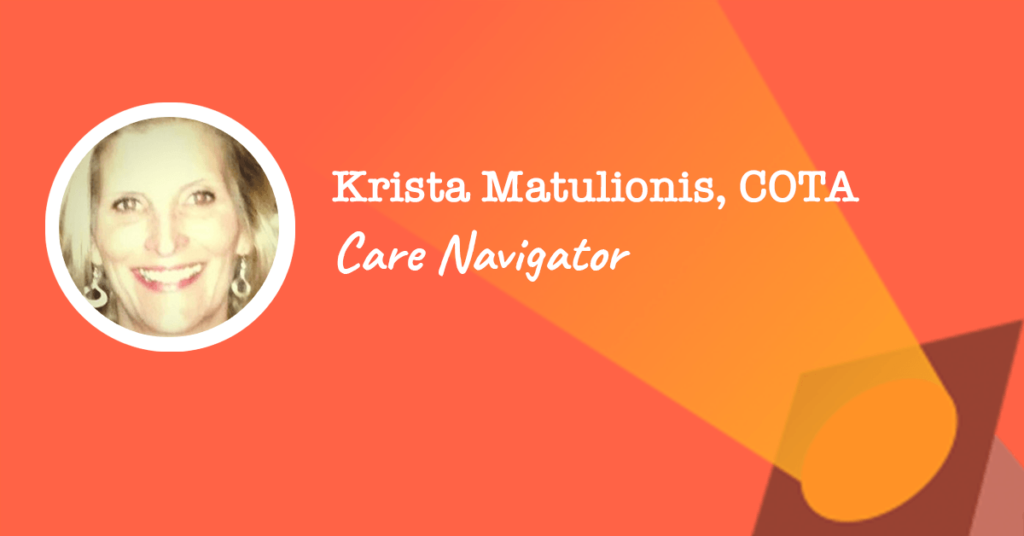Today’s non-clinical spotlight focuses on Krista Matulionis, a COTA working as a Care Navigator.
This post may contain affiliate links or codes. This won’t increase your cost, but it helps keep TNCPT alive, and free of annoying ads! Thank you for your support. 🙂
What is your full name and title at your current job?
Krista Matulionis, COTA
Care Navigator at HMA (Healthcare Management Administrators)

Where did you go to OTA school, and what year did you graduate?
Denver Technical College – 1999
I had initially earned my BA from University of Minnesota in 1994.
What did you do when you first finished school, and for how long?
My first position was at a hospital at a Transitional Care Unit doing direct patient care for about two years. Then, I started working in SNFs and continued direct patient care in various units in inpatient care settings/hospitals (orthopedics, ICU, cardiac).
Eventually, I started doing primarily contract work and a travel position. I gravitated toward pediatric school-based settings and industrial rehab settings.
What did you enjoy about your early roles? What didn’t you enjoy?
I loved working with patients and the opportunity to work with diverse multidisciplinary teams in different settings. I also enjoyed meeting therapists from all over with different skill sets.
I did not always enjoy the physicality of the job; it could be difficult and at times challenging day after day.
When did you realize you wanted to do something non-clinical?
I started noticing patterns in patients and healthcare depending on the diagnosis and setting I was in.
I wanted to understand this more, and also felt I was always more interested in the community around me and finding resources for patients.
This is when I did a certificate in Global Public Health and another certificate in Care Management. The idea of doing patient advocacy and navigation just fit.
Not to mention, the daily physical demands were a factor and increasing productivity demands were not conducive to spending time with patients.
What are you doing these days?
I am currently a Care Navigator full time for a local TPA (Third-Party Administrator).
Are you still treating patients, or are you solely non-clinical?
I’m in a solely non-clinical OT role.
How long have you been in your current role?
I have been in my role for two and a half years.
How did you find your job?
I found it through a job search looking on various job portals. I had entered the key phrases below in my search, and would receive notifications when those jobs popped up.
- Care Navigator
- Advocacy
- Care Management
I also stayed connected with my peers from my care management courses and attended seminars with the local patient advocacy organization, all of which helped me stay on track in my search.
Did you do anything special to your resume and cover letter to land the job?
I did not do anything very different with my resume. My cover letter was where I was able to explain my connection and interest with my clinical work, and tell a bit about my desire to transition into care navigation.
Did you get any special certifications or training along the way to help you get into your current role?
Yes, I got a certificate in care management from the University of Washington and a graduate certificate in global health from the University of Washington.
I also did some volunteer work at a local senior services organization working on the phones providing seniors with local resources and information.
Editor’s note: If you love working with aging adults, check out this article on starting a franchise with Caring Senior Service!
How have people reacted to you leaving direct patient care?
From the start, people were very positive when I told them I was transitioning out of direct patient care. I think that there is an overall sense of positivity and excitement around the idea that if one chooses not to do direct patient care, there are opportunities and options out there.
What’s a typical day or week in the life like for you?
I work from home. My responsibilities include working with members on the phone and assisting them in understanding and navigating their health plans.
This includes:
- Doing outreach calls to members with recent medical cases
- Being a liaison for members between other teams and providers
- Providing patient education to members on specifics if their plan
- Providing guidance in communication and questions to ask providers regarding care
- Giving patients basic direction in understanding the health care system
- Assisting patients in finding providers
- Data mining for chronic conditions
- Assisting with complicated claims issues.
- Working with the RN team for more complicated medical cases and case management
What are some of the challenges of your role? What are the rewards?
The most challenging part of my job is the sheer complexity of health insurance and the various different plans and groups I work with.
In the challenge is also the reward, though. It’s a great feeling to help someone figure out a complicated member issue, and being able to call them with good news.
I love talking to a member and hear them saying, “I never knew that about my plan.”
We can take for granted how difficult even the most seemingly simple aspects of health care can be for people. A simple answer or some direction can make all the difference to a member/patient.
How do you think working as a COTA prepared you for this role? Which skills transferred?
Working in various direct clinical and inpatient settings helps me understand what members are going through when I work with them.
Critical thinking skills obtained over the years helps looking outside the box when solving issues for the members.
I have a good sense of providers, patient/members and the overall health care system from my years of experience.
Roughly speaking, how are the hours and pay compared to patient care?
Comparable
What type of person do you think would do well in your role?
- Detailed-oriented
- Organized
- Excellent time management
- Flexible
Also, you’d need to be comfortable with not knowing everything every day.
Do you work remotely or on-site?
Remotely
Did you read any books, take any courses, or do anything special overall to get you where you are today?
Yes, as mentioned above, I received a certificate in care management, and a certificate in global health. I also attended seminars on patient advocacy.
I got a certificate in care management from the University of Washington and a graduate certificate in global health from the University of Washington.
Editor’s note: If you’re a MedBridge subscriber, they have a few great courses included in your unlimited CEU membership plan. These courses can help you determine whether care coordination/navigation is for you:
- Hospital Readmission Reduction Programs
- Overview of Care Transitions
- Reduce Hospitalizations in SNFs Part 1
- Reduce Hospitalizations in SNFs Part 2
What is a typical career path for someone in your role?
Patient advocacy or navigation is a recent role, especially with in the insurance setting.
The path would start with having a number of years of experience in direct patient care and an interest in public health—or at least a general understanding.
People I have met in other settings doing patient advocacy or care navigation typically have been in a direct patient care role at some point in their career.
Most people I work with have done some direct patient care and transitioned into this role, usually coming in from another department within the company. Others come from a direct patient care setting into a care navigator role.
What is next for you? What do you want to do with your career long-term?
There is so much to learn, and I feel content where I am at. That being said, there are care management certifications and some states are now doing patient advocacy certifications.
While not practicing OT directly, I still try to find courses that connect me to my COTA experience—yet also provide education in what I am doing currently—tying the two together.
Since patient advocacy is a newer to the health world, I would like to stay the course and see where this all takes me; there is so much ahead!
What would you recommend to someone who is considering going into a role like yours?
Stay connected to advocacy and care management organizations and remain connected to the therapy world.
Be open to change, and to making a transition in going from patient care settings to a corporate setting. Be open to learning any aspect of your job, even if it doesn’t seem to relate directly. In the end, it all helps, and are all tools for learning and growing.
If you could give yourself one piece of career advice you wish you had during your OTA program, what would it be?
Have a good mentor.
If you could teach anything to today’s graduate students in your profession, what would it be?
- Be humble and open to learning from your peers and predecessors.
- Direct experience and time will provide the skills and knowledge.
- Find a mentor.
- Volunteer outside of work, if possible.

Do you have any special advice for other PT/OT/SLP/assistants who want to follow in your footsteps?
Think outside the box and take extra courses. Make connections that interest you.
This includes volunteering. Look for mentors in the field, and do a lot of coffee meet ups and informational interviewing.
Thanks for your insight, Krista!





